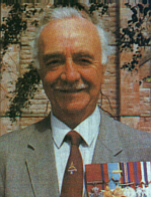Library Reference Number: 001
Bill Reid VC - A Tribute
 On November 28th 2001, Bill Reid VC BSc. died peacefully at this home in Perthshire, Scotland. As a leading light of the Aircrew Association, we shall miss his wit and wisdom greatly. In this article, using direct unedited quotes, we learn about the man whose tenacity and gallantry rightly earned him the Victoria Cross for Valour and who went on to found the Scottish Branches of the Aircrew Association.
On November 28th 2001, Bill Reid VC BSc. died peacefully at this home in Perthshire, Scotland. As a leading light of the Aircrew Association, we shall miss his wit and wisdom greatly. In this article, using direct unedited quotes, we learn about the man whose tenacity and gallantry rightly earned him the Victoria Cross for Valour and who went on to found the Scottish Branches of the Aircrew Association.
Bill Reid was just 21 years old when he flew his tenth bombing mission to Germany on November 3rd, 1943, as captain of Lancaster bomber '0' for Oboe.
He was carrying a 4,000 lb "cookie" bomb, six 1,000 bombs plus incendiaries and was part of a 500 strong force. Soon after crossing the Dutch coast at 21,000 ft there was a blinding flash as a Messerschmitt night fighter attacked, smashing the windscreen and wounding Bill in the head, hands and shoulder. The seven-man crew's oxygen supply and compass was destroyed, and navigation was possible only by observing the Pole Star.
The air rushing through the broken windscreen was bitterly cold and helped stem the flow of blood from Bill's wounds and preventing a fatal loss of blood. He lost consciousness several times and blood was freezing on his eyelids. He recalled: "I felt as if my head had been blown off'.” Despite this, he said nothing about his injuries to the crew, and kept the damaged bomber on course. Soon after this first encounter, another Luftwaffe night fighter attacked them and the Lancaster was riddled by shells killing the navigator, PlO Alan Jefferies, instantly and leaving the wireless operator Jim Mann fatally injured.
 Despite being wounded again in the second attack, Bill Reid elected to continue the mission. He and his crew faced heavy anti-aircraft fire while driving 200 miles deeper into enemy territory before dropping his bombs on the Mannesheim Steelworks at Dusseldorf - "bang on target." Only then did he turn the aircraft around to fly back to England, loosing consciousness several times during the flight.
Despite being wounded again in the second attack, Bill Reid elected to continue the mission. He and his crew faced heavy anti-aircraft fire while driving 200 miles deeper into enemy territory before dropping his bombs on the Mannesheim Steelworks at Dusseldorf - "bang on target." Only then did he turn the aircraft around to fly back to England, loosing consciousness several times during the flight.
Over the Channel, all four engines suddenly cut out before the crew realised they had forgotten to switch fuel tanks amid the confusion of battle. The plane, which had taken off from RAF Syerston near Nottingham, made a crash landing at a mist-bound U.S. base at Shipdham in Norfolk, with a collapsed undercarriage. American doctors patched up the crew and sent them on to a hospital in Norwich. Bill spent a further five weeks in Ely recuperating from his injuries.
While recovering, Air Vice Marshal Cochrane asked "Why didn't you turn back?" only to be told "I still had four engines operating and I thought it safer to carry on, rather than to turn back."
It is thought the freezing cold in the cockpit kept Bill alive by slowing the blood loss from his wounds. His previous nine trips had been, in his own words "Fairly uneventful, just searchlights to annoy us."
King George VI recognised Bill Reid's bravery and paid tribute to the young officer, &quo" " whose tenacity and dedication were beyond praise." King George presented him with his Victoria Cross at Buckingham Palace in July 1944. He had flown another twenty-four missions by then and it was strange irony that brought about the end of his operational flying career later that same month.
Flying a Lancaster from the elite 617 Dambusters Squadron, and one of 300 on a raid against a V2 rocket site near Rheims in France, Bill Reid was brought down.
He described the event, "We were bombing from 12,000 ft and there were more planes dropping delayed action bombs from 18,000 feet. They were supposed to be 15 minutes behind us but, as it turned out, one dropped his bomb-load right on top of us. The plane was torn apart and went into a terrible spin. When the nose fell off I was thrown out and I parachuted into a tree. Only one other crewmember got out, the other five all died in the plane. I tried to buy some time to give them a chance, but the controls were useless, as they had all been cut away by the bombs, which hit us from above. It was a lovely July evening and the planes above must have seen us below. Even then, we had 'friendly fire' incidents, and it makes the loss so much harder to bear."
Bill was captured while trying to reach Allied lines, and sent to StalagLuft 3 at Sagan in Poland.
As the Russian Army advanced he was moved to Luckenwalde, south of Berlin. The Russians eventually caught up with them again, and there was some fighting going on around the compound for about a week. Although Bill was eventually liberated when the Russians demolished the barbed wire fences with their tanks, it was a further month before he was handed over to the Americans. They took Bill to Leipzig areodrome, then on to Brussels where Bill recalls "I caught a plane - a good old Lancaster that same evening to fly to Lyneham."

